PI.lab Conference 2023
Algorithms and society
ZZIIN Stadspaleis Den Haag
Javastraat 26, 2585 AC, Den Haag
Thursday 13 April 2023
12:00 - 18:30
Preliminary Program
12:00 – 13:00 Lunch
13:00 – 13:10 Welcome words
13:10 – 13:25 Keynote
Monique Verdier, vice chair of the Dutch Data Protection Authority (Autoriteit Persoonsgegevens)
13:30 – 15:00
Panel discussion – Algorithmic fraud detection in the welfare state
In many countries, governments aim to use new technology to make the welfare state more efficient and to mitigate fraud. However, this digitisation can also erode people’s rights. In The Netherlands, the childcare benefits scandal has illustrated the risk of discrimination when the state aims to combat fraud in the welfare state. This panel discusses questions such as: Can algorithmic systems be used to combat welfare fraud, without threatening rights such as the privacy and non-discrimination? Can non-discrimination norms be built into algorithmic systems?
Panel discussion with the audience
Panel members:
- Hind Dekker-Abdulaziz, member of the Dutch parliament for D66
- Marc Steen, senior research scientist, TNO
- Nadia Benaissa, policy advisor, Bits of Freedom
- Sennay Ghebreab, Professor of Socially Intelligent AI, University of Amsterdam
Moderator: Frederik Zuiderveen Borgesius, Professor ICT & Law, iHub, Radboud University
15:00 – 15:30 Coffee
15:30 – 17:00 Two parallel tracks. Choose one of the two workshops:
I - Predictive policing: promises and pitfalls
Predictive policing concerns the use of automated predictions about who will commit crime or when and where crime will occur. The police in the Netherlands uses CAS, the Crime Anticipation System. The system aims to predict where crime will occur: distinguishing blocks of 125x125 meter on the map of The Netherlands. This panel discusses questions such as: how effective is predictive policing in combatting crime? Are there risks, for instance related to discrimination? Do the advantages of predictive policing, such as efficiency, outweigh the disadvantages?
Interactive discussion, moderated by Frederik Zuiderveen Borgesius
Discussants: the audience, and
- Gwen van Eijk, Amnesty International
- Kelly Vink, Policy worker at the Dutch Public Prosecutors Office
- Cynthia Liem, Associate Professor working on trustworthy AI, Delft University
-
Marloes van Noorloos, Associate professor criminal law, Leiden University
II - Cyber security in the Internet of Things
The Internet of Things has become a reality. Many consumers use so-called ‘smart’ devices, such as watches, energy meters, voice assistants, and internet-connected baby cameras.
However, such IoT devices brings serious security risks, as is the topic of the national research project INTERSCT (intersct.nl). For instance, a few years ago, the Mirai botnet infected hundreds of thousands of IoT devices. Security leaks in IoT devices can enable spying in people’s homes. How can the security of IoT devices be improved? What can different stakeholders (e.g. companies, academics, policymakers, consumers) do to improve security of the Internet of Things?
Interactive discussion, moderated by Bart Jacobs, Professor of Security, Privacy and Identity, iHub, Radboud University
Discussants: the audience, and
- Michel van Eeten, Professor of Governance of Cybersecurity, Delft University
- Ot van Daalen, Lecturer and Researcher at the University of Amsterdam, founder of a law firm specialised in privacy and security (Root Legal)
- Nelly Ghaoui, Team leader cybersecurity and privacy at the directorate for digital economy at the Ministry of Economic Affairs and Climate Policy (EZK)
- Yvo Verschoor, Digital consumer products expert, Consumentenbond (Dutch consumer organisation).
17:00 – 18:30 Drinks
* * *
Registration
The event is at full capacity. You cannot register anymore. The event will not be streamed or recorded.

